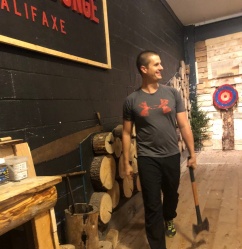by Lil Crump

FACULTY PROFILE
Dr. Scott Kehler
Assistant Professor
BPE, BKin, MSc, PhD (UofM)
Publications:
Researchgate
In this issue of Physiotherapy Matters we are pleased to be featuring the research interests of the School of Physiotherapy’s newest Assistant Professor, Dr. Scott Kehler. As is the case with many a newcomer, it didn’t take Scott long to discover just “how great it is to live in Halifax, and how much there is to explore in Nova Scotia.”
Being a Manitoban, acquired much of his educational training at the University of Manitoba. It was there, while conducting research during his master’s program, that Scott worked with patients requiring heart surgery. He observed that approximately half of the patients he worked with were frail before their surgery which made them vulnerable to poor health outcomes compared to people who are not frail. This observation motivated Scott to pursue a career in research to further study this important field of interest. Scott went on to complete the Applied Health Sciences PhD program in 2017 and then completed a postdoctoral fellowship at Dalhousie University in the Division of Geriatric Medicine before starting his appointment in the Dalhousie’s School of Physiotherapy in September 2019.
Scott was drawn to Dalhousie because he, “wanted to be mentored from the best. Dalhousie has one of the best research groups who study geriatrics in the world. Drs. Ken Rockwood and Olga Theou are among the top ranked researchers who study frailty and aging worldwide.”
Simply put, Scott’s research aims to promote healthy aging. It is a common belief that as people age they are more likely to develop health problems. But does it have to be a consequence of old age? Some people develop health issues while other people are healthier in their old age. The concept of frailty is a way to understand how people age in good or poor health. Research consistently shows that people with higher levels of frailty are more likely to have worse health outcomes. This means that finding ways to manage or even prevent frailty will be important for the health and well-being of people as they grow older. With this in mind, Scott studies the impact of lifestyle behaviors, particularly physical activity and sedentary behaviors, on degrees of frailty. He uses epidemiological and clinical studies in a diverse set of populations, ranging from community-dwelling adults, to patients who are in acute care or require heart surgery.
Scott gathers his data locally by testing patients admitted to acute care and referred to cardiac rehab programs, he also draws from larger national and international datasets of community-dwelling participants. “The Canadian Longitudinal Study of Aging,” Scott explains, “has a wealth of data to help us understand health and aging, ranging from social, environmental, and biological levels”.
Scott uses Cardiac Rehabilitation as a model of care to manage frailty as it is one of the most well-established models of care using exercise as medicine. Scott explains, “We know that exercise has health benefits that go beyond cardiovascular health. This means that cardiac rehab could have a significant impact on the treatment of other health problems which usually come as a package with older age. If we view the benefit of cardiac rehab programs in this way, knowing patient frailty levels in these programs, it will help to tailor their treatment to manage not only cardiovascular health, but also overall health.” Scott’s aim is to investigate frailty in cardiac rehab programs including: whether such programs can reduce frailty levels, if changing frailty is related to improving patient outcomes, and if there is value in frailty assessment. The long-term goal of his research program is to use alternative cardiac rehab models such as eHealth strategies to maximize the potential for people who may not be able to attend center-based programs.
We have an increasingly aging population who are more likely to be frail, and there is a growing interest in prioritizing frailty management to address the complexities of aging. Scott believes that knowing patient frailty levels could have a significant impact in the delivery of prevention and rehabilitation programming, and that understanding frailty could guide healthcare decision-making to tailor or provide more intensive therapy so that those who are in the worst health can benefit. If frailty can be effectively managed with rehabilitation (such as cardiac rehab), it will become important to understand if changing frailty leads to improved health outcomes and if frailty can be assessed as a part of care within rehabilitation programs.
As a small piece of advice for anyone pursuing a career in physiotherapy research, Scott offers, “whether it is in physiotherapy or in another research program, you should believe in yourself and know that it is OK to fail. Successes and failures all come with a career in research. Being resilient to the failures is what will help you to succeed.”
When not working Scott, of course, loves spending time with his family. “I have a two-and-a-half-year-old and a one year old so they keep my partner and I entertained (and busy)”. In the winter he stays active by playing hockey - as a goalie he finds ample opportunity to play. As a golf enthusiast, Scott is very much looking forward to a summer of, as he puts it, “testing my lack of skill on the amazing courses of Nova Scotia.” And finally, for any of our readers who roam the Forrest Building halls, feel free to stop and say hi to Scott and ask him about his recent experiments “baking on a smoker”.

